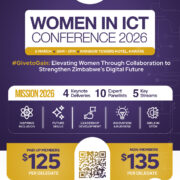By Ross Moyo
Zimbabwe’s telecoms regulator, the Postal and Telecommunications Regulatory Authority of Zimbabwe (Potraz), has taken a major leap in bridging the country’s digital divide by transforming post offices into digital hubs and expanding ICT access across underserved communities.
Speaking at the World Summit on the Information Society (WSIS)+20 Forum held recently in Geneva, Potraz Director General Dr. Gift Machengete announced that 143 post offices have been renovated and repurposed into Digital Centres to provide communities with access to essential digital tools, internet connectivity, and e-government services.
In addition, Potraz has established 202 Community Information Centres (CICs), primarily in rural areas, with a strong focus on inclusivity for elderly citizens, ensuring they have convenient access to ICT resources and services, including telemedicine.
“Digital centres will help bridge the digital divide and assist users to create digital products,” said Dr. Machengete.
“There is access to digital tools, training, and affordable internet connectivity. To ensure inclusivity, especially for the elderly, we have set up 202 community information centres across rural areas.”
The transformation of post offices into digital hubs is part of Zimbabwe’s broader push toward a knowledge-based, digitally empowered society, aligned with Vision 2030. These centres now serve as digital transformation zones, enabling citizens to engage in e-commerce, access government services online, and participate in digital skills training.
Dr. Machengete emphasized the importance of leaving no one behind, noting that Zimbabwe’s strategy encompasses infrastructure development, technology support, gender empowerment, financial aid, and policy advocacy.
“We are laying the foundation for a more equitable and digitally empowered Zimbabwe. Our efforts are targeted at building a society where no one is left behind,” he said.
Potraz’s initiatives showcased at WSIS+20 reflect Zimbabwe’s commitment to inclusive connectivity and demonstrate the country’s progress in leveraging ICTs to promote development and social equity.














Comments